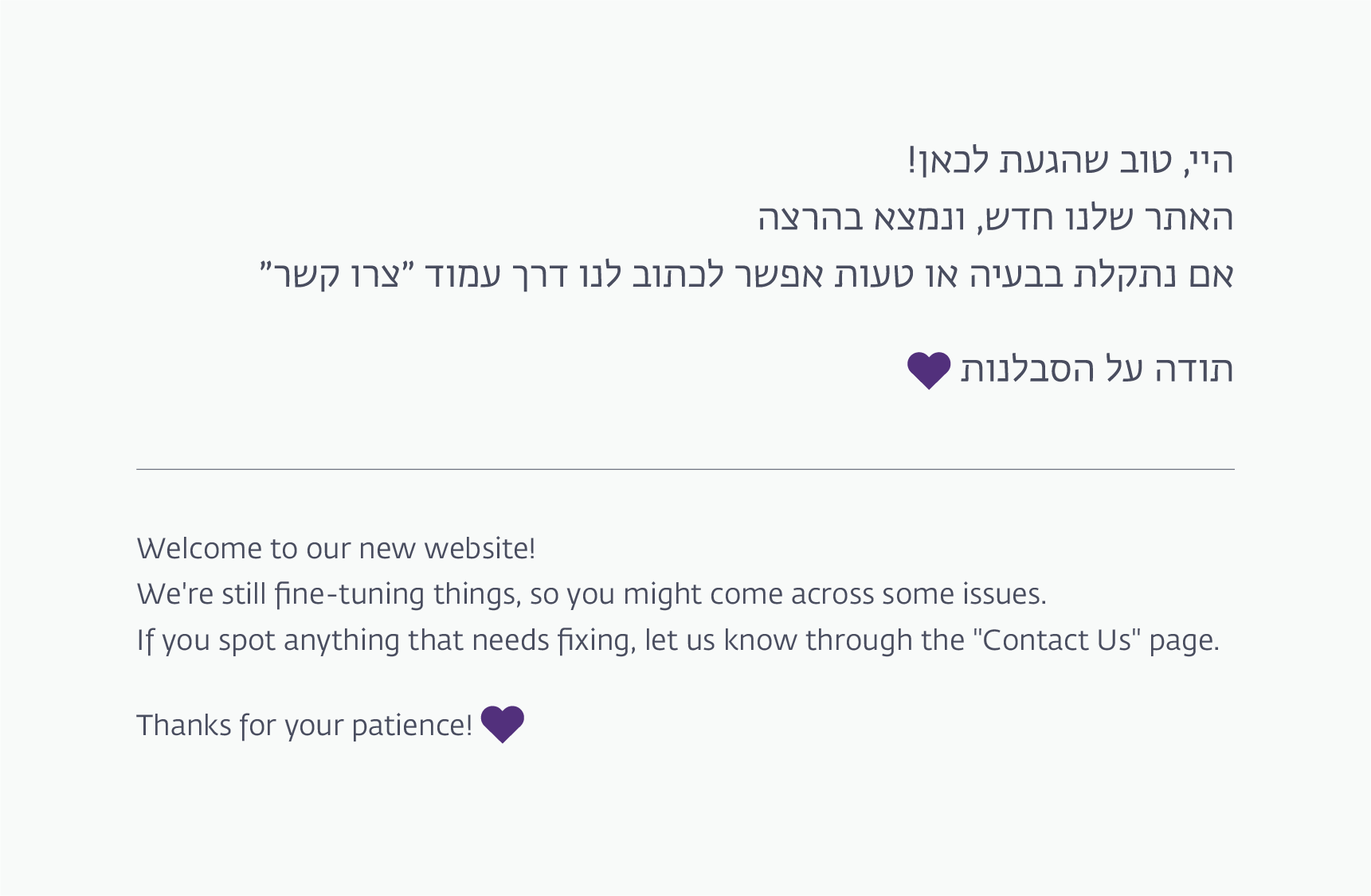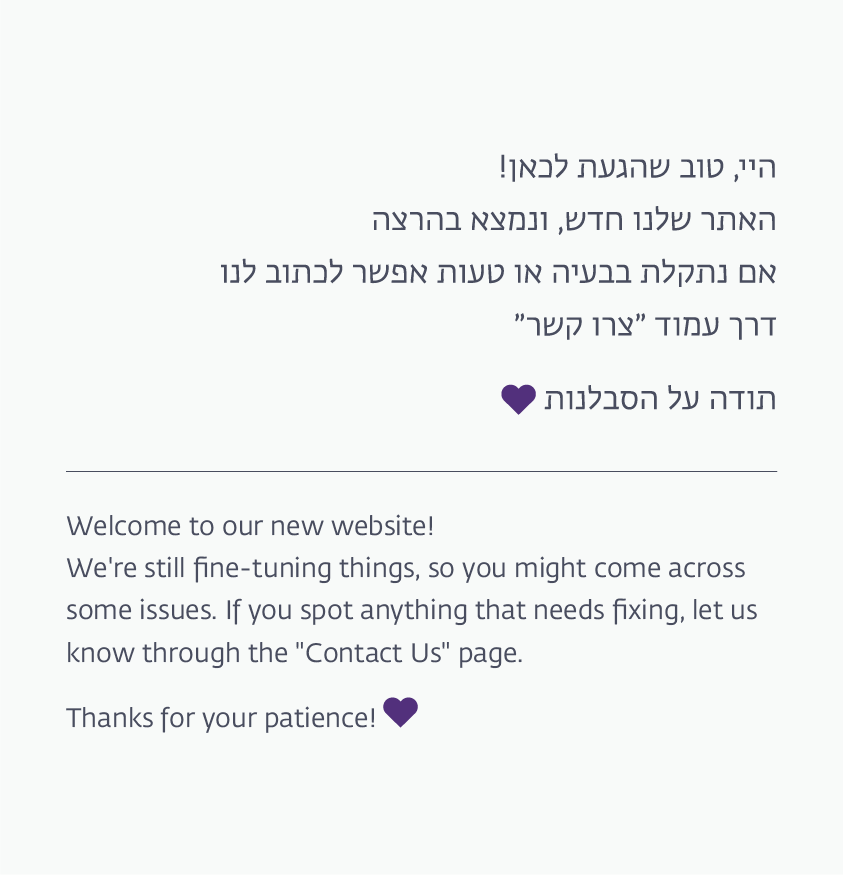Civil Lawsuit (Tort Claims)
In short:
- The purpose of a civil lawsuit is to seek financial compensation for the harm caused by sexual violence.
- A civil lawsuit is independent of criminal proceedings – it can be filed even if no police complaint was made, at any stage during a criminal trial, or even after the criminal process has concluded.
- There are several types of relevant civil proceedings, including a standard tort claim, a civil lawsuit linked to a criminal conviction, and a lawsuit filed in labor court for workplace harassment.
- The Sexual Assault Crisis Centers provide free guidance and support (not legal representation) when filing a civil claim.

What Is a Civil Lawsuit?
A civil lawsuit is a legal process based on tort law, where one party sues another for damages they suffered.
The court determines whether harm occurred and assesses the extent of damages, awarding financial compensation accordingly.
Unlike criminal cases, civil lawsuits require private attorneys (not government prosecutors), meaning the plaintiff must cover legal costs.
Additionally, since civil cases are disputes between individuals, they do not result in criminal convictions or prison sentences.
What Is a Civil Lawsuit for Sexual Violence?
Survivors of sexual offenses and harassment can file a lawsuit against the perpetrator.
Additionally, they may sue third parties responsible for preventing or addressing the harm but failed to do so (e.g., family members who knew about the abuse but did not stop it, or a school that failed to handle a reported incident appropriately, etc.).
In cases involving multiple defendants, the court may divide liability and determine compensation accordingly.
During the trial, the survivor must convince the court that the harm occurred and prove the damages they suffered.
If the perpetrator has already been convicted in a criminal trial, the lawsuit focuses only on proving damages, as guilt has already been established.
If the sexual violence occurred in the workplace, the lawsuit must be filed in labor court.
Examples of damages that can be claimed:
- Pain and suffering – Emotional distress, trust issues, low self-esteem, difficulties forming relationships, loss of enjoyment in life or intimacy.
- Loss of earning capacity – Difficulty working or studying due to trauma, temporary or permanent job loss.
- Rehabilitation costs – Expenses for psychological, physical, or alternative therapies, medications, services, etc.
- Dependence on assistance – Costs related to needing third-party help due to impaired functioning.
If the lawsuit is successful, the court quantifies the damages and determines compensation based on legal guidelines and precedents.
For workplace sexual harassment, courts can award up to 120,000 ILS in damages without requiring proof of harm.
Why Consider a Civil Lawsuit in Sexual Violence Cases?
Civil lawsuits benefit survivors in two ways:
- Recognition and justice: The lawsuit allows the court to formally acknowledge the harm.
- Financial compensation: Helps cover therapy costs, lost earnings, lifestyle adjustments, and other expenses.
Additionally, since the burden of proof is lower in civil cases than in criminal cases, lawsuits may succeed even in cases that do not meet the strict evidentiary requirements of a criminal trial.
How to File a Civil Lawsuit?
- A civil lawsuit requires hiring a private attorney specializing in tort law, preferably one experienced in sexual violence cases.
- The process typically begins with an initial consultation, where the attorney explains the process, expected challenges, and costs.
- In cases where there has already been a criminal conviction, survivors may qualify for free legal representation from the Legal Aid Unit.
Even without a conviction, survivors may still qualify for free legal representation, depending on eligibility criteria.
Time Limits for Filing a Civil Lawsuit
In Israel, a civil lawsuit must be filed within the legal time limits (called the statute of limitations). These deadlines depend on factors such as the survivor’s age at the time of the assault, the perpetrator’s age, their relationship, and whether criminal proceedings took place.
General statute of limitations (subject to legal consultation):
- Sexual violence and harassment against adults (18+): 7 years from the date of the offense.
- Sexual violence and harassment against minors: Until age 25 (7 years after turning 18).
- Child sexual abuse within the family (incest): Until age 35.
It is highly recommended to consult with a Sexual Assault Crisis Center or an attorney for case-specific guidance.
How Does a Criminal Complaint Affect a Civil Lawsuit?
A civil lawsuit can be filed with or without a criminal complaint, before, during, or after criminal proceedings:
- No criminal complaint filed – a civil lawsuit can proceed independently.
- Police complaint filed, but case was closed – A civil lawsuit can still be pursued, though the existence of a closed criminal case may affect the civil proceedings.
- Criminal investigation or trial is ongoing – A civil lawsuit can be filed, but court hearings may be postponed until the criminal case concludes.
- Conviction or acquittal in criminal court:
- After a conviction, survivors can file a civil lawsuit following a criminal case (see below).
- If more than a year has passed since the conviction, a standard civil lawsuit must be filed, with the criminal verdict serving as evidence.
What are the Key Differences Between a Civil Lawsuit and a Criminal Complaint?
- Purpose and Outcome
- Civil lawsuit: Seeks financial compensation for damages
- Criminal complaint: Aims to hold the perpetrator accountable through punishment, such as imprisonment or other legal penalties
- Who Files the Case?
- Civil lawsuit: The survivor sues the perpetrator (or responsible parties) and makes all decisions in the case
- Criminal case: The state prosecutes the perpetrator, and legal decisions (e.g., investigations, plea deals, sentencing) are made by law enforcementand prosecutors. The survivor is not a legal party in the case.
- Burden of Proof
- Civil lawsuit: The case must be proven by a balance of probabilities (over 50% likelihood that the survivor’s version is true)
- Criminal case: Guilt must be proven beyond a reasonable doubt (~99% certainty)
There are additional differences regarding legal procedures, time limits, and rules of evidence.
What Is a Civil Lawsuit Following a Criminal Case?
A civil lawsuit following a criminal case is a faster process that follows a criminal conviction.
This type of lawsuit must be filed within one year of the conviction, and the same judges from the criminal trial oversee the lawsuit.
Since guilt has already been established, the court only determines the amount of financial compensation.
Note: A civil lawsuit following a criminal case (such as employers or institutions that failed to prevent the harm).
What Are the Main Challenges in Civil Proceedings?
While civil lawsuits offer financial compensation and recognition, they are also complex legal procedures with financial barriers that may prevent some survivors from filing claims.
How Can Sexual Assault Crisis Centers Help?
Crisis centers offer free guidance and support for filing civil lawsuits, including:
- Explaining the legal process and available options.
- Providing information about legal rights in civil proceedings.
- Helping mediate communication with attorneys when necessary.
- Accompanying survivors to court hearings for emotional and practical support.
Note: This service is not legal advice and does not include legal representation.
To receive support, contact a Sexual Assault Crisis Center.
Last updated: 28.08.2025







